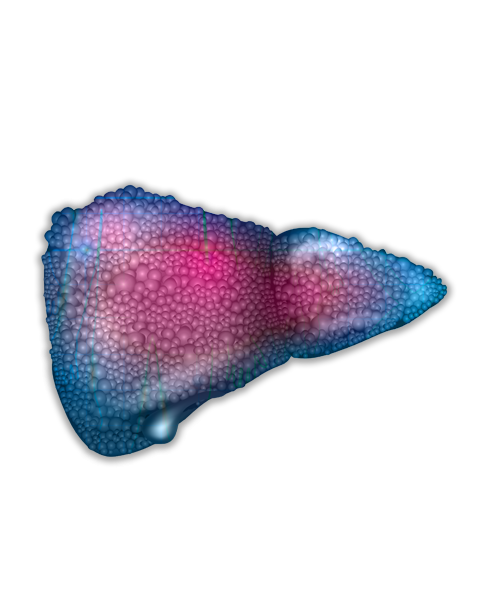Liver Disease Models
Tailored Pharmacology Solutions to
Advance Drug Development

Advancing Therapies for Liver Diseases
Human liver diseases are conditions that damage the liver and impair its vital functions. Causes range from viruses and drug toxicity to long-term injury, alcohol use, metabolic diseases and inherited disorders. They affect 1.8% of the U.S. population and rank as the 10th leading cause of death. Globally, millions suffer from chronic liver injury, placing a growing burden on healthcare systems. Despite existing treatments, many patients remain at high risk for complications like liver failure and hepatocellular carcinoma, highlighting the urgent need for innovative therapeutic solutions that address complex disease mechanisms, improve safety, and support liver regeneration.
As a preclinical drug discovery research organization, Inotiv supports liver disease research with comprehensive preclinical models and ex vivo and in vivo pharmacology services. Our translational liver disease models replicate key pathophysiological features, enabling precise evaluation of therapeutic efficacy, safety, and underlying mechanisms. We collaborate with clients to customize studies, providing expert guidance from model selection to experimental design and data interpretation. This flexible, full-service approach empowers researchers to advance their programs efficiently and generate meaningful results that drive therapeutic innovation.
In Vivo Models of Liver Diseases
Liver Fibrosis Models
Liver fibrosis is a wound-healing response that leads to scarring in the liver following injury. It is most often triggered by chronic inflammation associated with conditions such as alcoholism, chronic hepatitis, Metabolic Dysfunction-Associated Fatty Liver Disease (MAFLD), or cholestasis (restricted bile flow). Over time chronic inflammation and persistent liver injury can promote liver fibrosis, leading to more severe hepatic diseases, including cirrhosis and liver failure, significantly impacting liver function and overall health. Early diagnosis and management are crucial to prevent irreversible damage.
Key Models
- Bile Duct Ligation (BDL)-Induced Liver Fibrosis Mouse and Rat Model
- Carbon Tetrachloride (CCI4)-Induced Liver Fibrosis Mouse Model
- Thioacetamide (TAA)-Induced Liver Fibrosis Rat Model
Metabolic Dysfunction-Associated Steatohepatitis (MASH) Models
MASH is a progressive form of Metabolic Dysfunction-Associated Fatty Liver Disease (MAFLD), a condition caused by excess fat buildup in the liver, called hepatic steatosis, unrelated to alcohol intake. As this liver disease advances, liver inflammation and damage occur, leading to hepatic fibrosis (scarring). In some cases, persistent injury can induce liver fibrosis, accelerating disease progression. In its severe stages, MASH can progress to cirrhosis, increasing the risk of liver cancer and failure. While the exact causes are unclear, obesity, type 2 diabetes, high LDL cholesterol, and metabolic syndrome are major risk factors. The growing prevalence of obesity and diabetes has driven a rise in MASH cases, making it a significant global health concern.
Key Models
- Choline Deficient High Fat Diet-Induced MASH Mouse and Rat Model
Liver Regeneration Models
Liver regeneration is the process by which the liver replaces damaged or lost tissue, making it the only internal organ capable of extensive self-repair. The liver can regenerate following injuries such as partial hepatectomy or exposure to hepatotoxic agents, including chemicals, toxins, or certain medications. It can regrow to its original size even after as much as 90% of its mass has been removed. This regenerative capacity is critical for maintaining liver function and overall metabolic health.
Key Models
- Partial Hepatectomy Mouse and Rat Model
Hepatitis B Models
Hepatitis B is a serious liver infection caused by the hepatitis B virus. While the infection is typically short-term (acute) for most people, lasting less than six months, it can become chronic in some individuals. Chronic hepatitis B significantly increases the risk of liver failure, liver cancer, and cirrhosis — a condition characterized by permanent liver scarring.
Key Models
- Hepatitis B Virus Infection Mouse Model
Acute Liver Injury Models
Acute liver failure is the rapid loss of liver function that occurs within days or weeks, often in a person with no preexisting liver disease. This serious condition can result from causes such as viral infections, drug-induced liver injury (commonly from acetaminophen overdose), autoimmune disorders, or toxin exposure. Without prompt medical intervention, it can lead to severe complications, including bleeding disorders, brain swelling (hepatic encephalopathy), and multi-organ failure.
Key Models
- Acetaminophen-Induced Liver Injury Mouse Model
Not seeing the model you need? Explore all our models for Cardiovascular Disease or contact us to discuss developing a new model for your drug development program. Our strong dedication to scientific research and development fuels the ongoing development of novel models and the enhancement of traditional disease models, providing you with advanced solutions customized to meet your research requirements.
Selected Study Endpoints
In pharmacology studies focused on preclinical drug development for acute and chronic liver diseases, we provide an extensive selection of essential endpoints to evaluate both therapeutic efficacy and safety. While this is just a glimpse of our capabilities, we offer a wider array of services and collaborate closely with our clients to create tailored solutions that address their unique research requirements.
- Portal vein pressure
- Markers of liver function, injury, and regeneration
- Comprehensive panel of hepatic biomarkers
- Histology and pathology
Comprehensive Services for Drug Development
We provide a full suite of research services to support every stage of drug development, from early discovery to the critical data required for IND filings. Our integrated approach streamlines the process, enhancing efficiency and effectiveness. With a focus on customized solutions, we deliver robust, translational data to drive successful outcomes. Our expertise in preclinical research ensures rigorous evaluation of drug candidates, providing valuable insights to inform development decisions. Explore our key service areas, each designed to support drug discovery and development with precision and expertise.
In Vivo Models for Other Cardiovascular and Related Diseases
Failure Heart
Failure Inotiv provides translational rodent and large animal models, along with flexible research services and expert consultation, to accelerate heart failure drug discovery. Our in vivo pharmacology services deliver clinically relevant insights and robust efficacy data.
Disease Metabolic
Disease Inotiv supports diabetes, obesity, and metabolic disease research with in vivo models and tailored pharmacology studies. Our translational models deliver clinically relevant insights, with expert guidance from study design to data interpretation to advance therapeutic development.
Disease Pulmonary
Disease Inotiv provides in vivo models and pharmacology services to support pulmonary disease drug discovery. Our models reflect key features of obstructive, restrictive, and vascular conditions, enabling precise efficacy and safety assessment through customized, expert-guided studies.
Disease Renal
Disease Inotiv offers a diverse portfolio of rodent models of kidney disease and preclinical research services that support drug discovery efforts with clinically relevant and customizable solutions.



